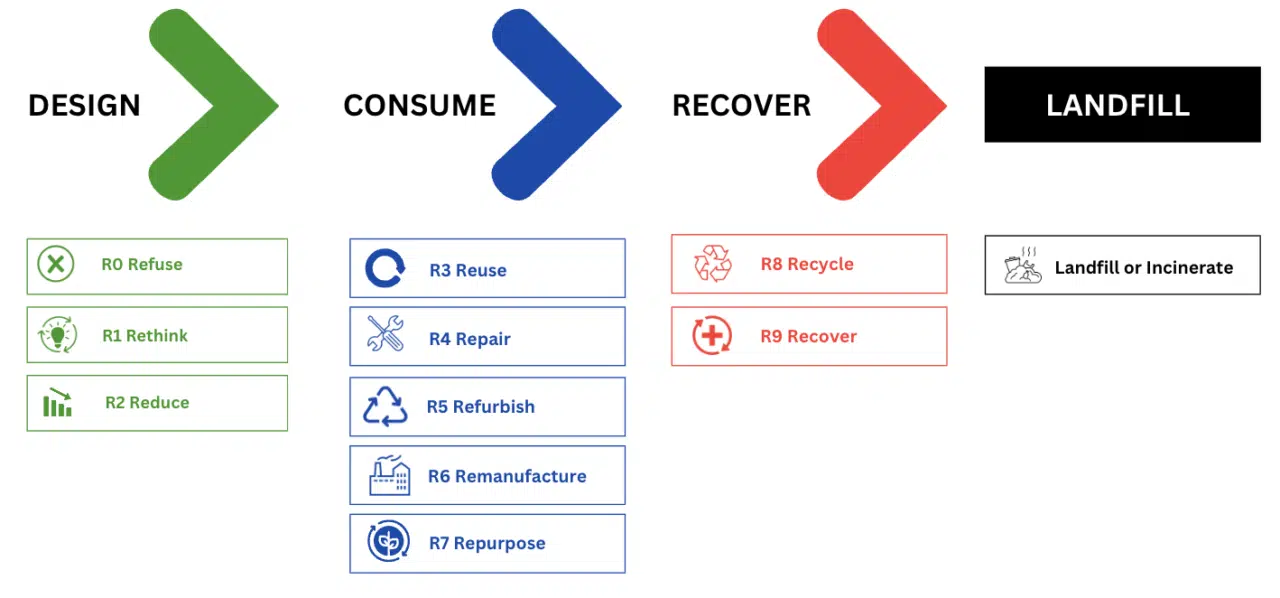Highlights from Fashion 360, London
By John Romeis, Columbus Consulting

This year’s Fashion 360 meeting in London brought together leading retailers, manufacturers, textile developers and technology partners to discuss sustainable circularity. While the topic of sustainable retail has been circulating for several years, the ability to define, quantify and scale the practice in the fashion industry has been challenging. In fact, only 1% of fibers are currently being recycled and, while fashion development and production is a leading source of waste, 85% of textile waste is post-consumer. So, the new goal from a circularity point of view is: “keep items in use.” Of course retailers still need to drive sales, but now the focus has enlarged to consider the post sales channel. During the summit, the industry discussed the modern considerations for a garment, known as the R-strategies:

A key theme to the R-strategies is the use of digital product passports to track goods from source to shelf and beyond. The garments, themselves, are now being considered digital assets to collect, track and measure. But DPPs are only one element of the circular landscape. Brands need to design for recycling—leverage fabrics that address longevity, use/wear. The end game is to defer recycling for as long as possible and keep the garment in use and out of the landfill. The key to fashion’s success in the circular market is collaboration. Designers, merchandisers, buyers, finance teams, sourcing groups, planning & allocation organisations, along with stores and more, all need to work together with shared goals and KPIs. Being sustainable is not just the responsibility of operations and marketing.
While retailers are motivated by forthcoming legislation and regulations, they are also focused on cultural adaptation. Finding profitable solutions that are more environmentally responsible is a critical goal for many in the industry. From product tagging to re-commerce experiences, brands are looking to technology, process and people to all be part of the plan. Overall waste reduction works from both ends of the supply spectrum—produce less, reuse more. But where is the starting point? According to Columbus Consulting’s Sustainability Lead and Associate Partner, Charlotte Haynes, “retailers need to start now. The first step is to identify where you are in the journey, assess your systems and capabilities and review talent and skillsets. Working with experts who can work in parallel with your organization is critical to make progress while continuing to drive daily business.” Haynes further states that, “DPPs are only one part of the equation. Before you consider implementing any technology or systems, retailers need to clean their data and make sure they have data management and governance in place. Then they need to identify all of the available data sources to leverage. Preparation is key to long-term success.”
MORE ABOUT COLUMBUS CONSULTING
Columbus Consulting delivers solutions that drive true value and have been transforming the retail and CPG industries for over two decades. We are a retail consulting company of industry experts. Our approach is simple, if you do it, we do it. We are more than consultants; we are experienced practitioners who actually sat in our clients’ seats. We understand the challenges, know what questions to ask and deliver the right solutions. Columbus offers a unique, consumer-centric approach with an end-to-end perspective that bridges functional & organization silos from strategy to execution. Our specialties include: unified commerce, merchandising & category management, planning & inventory management, sourcing & supply chain, data & analytics, accounting, finance & operations, people & organization and information technology. Let us know how we can help you. To learn more, visit COLUMBUSCONSULTING.COM.

